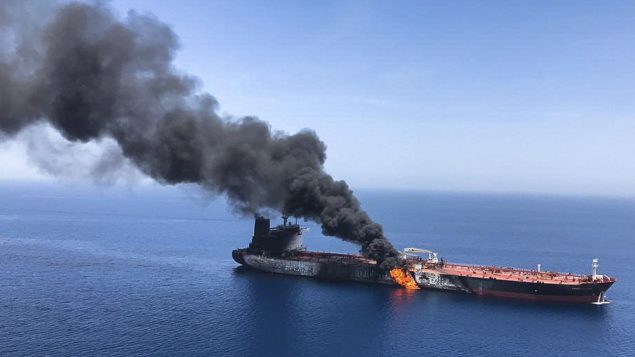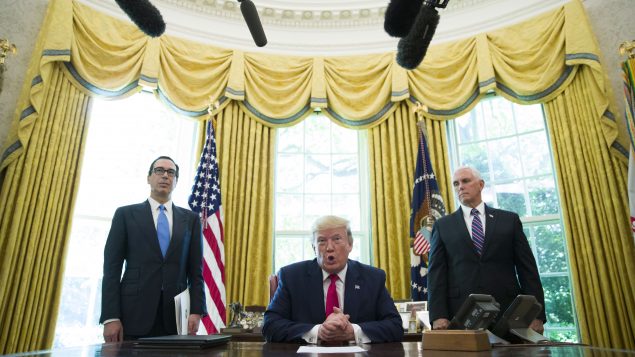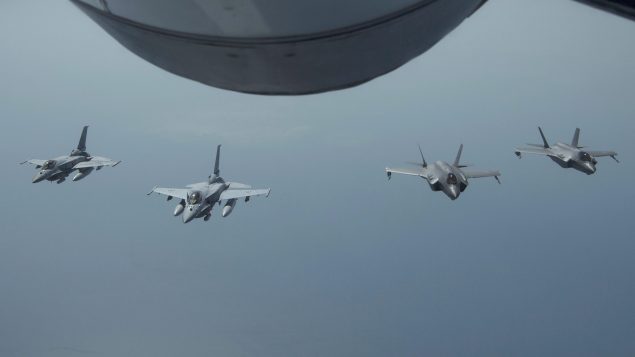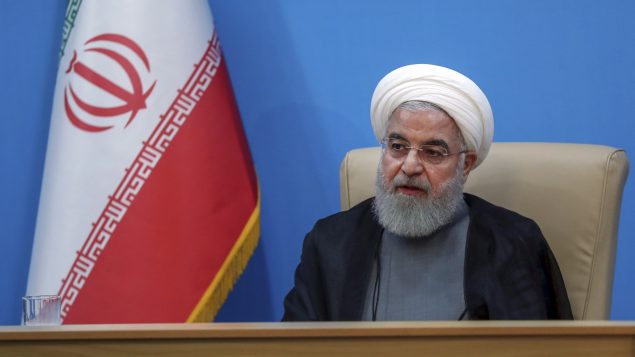Washington and Tehran have reached a dangerous impasse as U.S. President Donald Trump threatened on Tuesday to obliterate parts of Iran if it attacked “anything American,” with Iranian officials calling White House actions “mentally retarded,” says a Canadian expert on Middle East politics.
Trump on Monday signed an executive order imposing sanctions against Iranian Supreme Leader Ayatollah Ali Khamenei and other senior figures, with punitive measures against Foreign Minister Mohammad Javad Zarif expected later this week.
The moves came after Iran shot down a U.S. drone on June 20 and Trump called off a retaliatory air strike minutes before impact, saying too many people would have been killed. It would have been the first time the United States had bombed the Islamic Republic in four decades of mutual hostility.
On Tuesday, however, Trump tweeted: “Any attack by Iran on anything American will be met with great and overwhelming force. In some areas, overwhelming will mean obliteration.”
Bessma Momani, Professor in the Department of Political Science at the University of Waterloo, said the latest flare-up in deeply personal attacks is indicative of the escalation between the U.S. and Iran.
“The Iranians obviously want to get relief from the international sanctions,” Momani said in a phone interview.
“At the moment 80 per cent of the country is under economic sanctions, people are struggling, the regime is hurting and all of that is basically pushing them to try and hit, not perhaps the Americans directly, because they are smart enough not to do that, but to provoke the U.S.”
(click to listen to the full interview with Bessma Momani)
ListenA game of chicken?

FILE – In this Thursday, June 13, 2019 file photo, an oil tanker is on fire in the sea of Oman. A series of attacks on oil tankers near the Persian Gulf has ratcheted up tensions between the U.S. and Iran — and raised fears over the safety of one of Asias most vital energy trade routes, where about a fifth of the worlds oil passes through its narrowest at the Strait of Hormuz. T(AP Photo/ISNA, File)
Provoking the U.S. includes everything from hitting oil tankers in the Strait of Hormuz, through which up to one-fifth of world’s oil shipments pass, to shooting down a U.S. spy drone, which the Iranians claim was in their international waters, Momani said.
“It’s really a way of trying to hit the Americans but not directly and not militarily in a way that would escalate matters, but in their mind hopefully to induce them to negotiate a way out of the sanctions,” she said. “Of course we see the reverse happening with the Americans: they are pushing for even more sanctions.”
In a televised address on Tuesday, Iranian President Hassan Rouhani said the new sanctions against Khamenei would have no practical impact because the top cleric had no assets abroad.
Rouhani, a pragmatist who won two elections on promises to open Iran up to the world, said the White House’s actions were “mentally retarded” – an insult that other Iranian officials have used in the past about Trump, but a departure from Rouhani’s own comparatively measured tone over the years.
Crippling sanctions

President Donald Trump speaks before signing an executive order to increase sanctions on Iran, in the Oval Office of the White House, Monday, June 24, 2019, in Washington. Trump is accompanied by Treasury Secretary Steve Mnuchin, left, and Vice President Mike Pence. (Alex Brandon/AP Photo)
The United States has imposed crippling financial sanctions against Iran since last year when Trump withdrew from a 2015 deal between Tehran and world powers under which it curbed its nuclear program and won a removal of sanctions in return.
The crisis has escalated sharply since last month when the Trump administration tightened its sanctions noose, ordering all countries to halt purchases of Iranian oil.
That has effectively starved the Iranian economy of the main source of revenue Tehran uses to import food for its 81 million people, and left the pragmatic wing of Iran’s leadership, led by Rouhani, with no benefits to show for its nuclear agreement.
Momani said while the sanctions are not very effective in changing the dynamic between Tehran and Washington, they have made the U.S. president even keener on inflicting pain on the Iranians.
“We’re really at an impasse here,” she said. “And sadly it’s the average Iranian and some of the regional countries who are really paying the price of all of this escalation.”
High risk of miscalculation

FILE – In this May 29, 2019 file photo released by the U.S. Air Force, United Arab Emirates Air Force Desert Falcons fly in formation with U.S. F-35A Lightning IIs in an undisclosed location in Southwest Asia. Tensions between the United States and Iran have soared in recent weeks, with Washington dispatching warships and bombers around the Persian Gulf, and Tehran threatening to resume higher uranium enrichment. The tensions come a year after President Donald Trump withdrew from Irans 2015 nuclear accord with world powers and restored crippling sanctions. (Staff Sgt. Chris Drzazgowski/U.S. Air Force via AP, File)
Momani said she doesn’t see a way out of this impasse.
“The only way out is continuing like this bumbling along until, perhaps, sadly there may be even a miscalculation that escalates things to a military confrontation,” Momani said.
Until then, the Iranian strategy seems to be to tough it out in hopes that the next president of the U.S. will restore the Iran deal, she added.
Iran is also putting pressure on European countries that signed the Iran nuclear deal, known as the Joint Comprehensive Plan of Action (JCPOA), to mitigate the impact of U.S. sanctions.
But the challenge is that many European companies are too afraid to continue to do business with Iran because they don’t want to jeopardize their operations in the U.S., Momani said.
“It really is very complicated and it seems like very little options are on the table for de-escalating things,” Momanin said.
And while countries like Russia, China, India and Turkey continue to do business with Iran, trade with Tehran becomes a “company risk,” she said.
“If you are Turkish Airlines, for example, and have business dealings in Iran, you’re going to have a difficult time then operating in the United States,” Momani said. “And that’s really the crux of the problem.”
While some smaller companies will certainly continue to trade with Iran, and while some countries like Iraq, who heavily depend on the import of Iranian energy for survival, may receive U.S. waivers to trade with Tehran, Iran is not going to get the economic relief it needs, Momani said.
“So its only way to lash out and try and get rebalancing to get some sort of resolution to this is frankly through this low level grade conflict,” Momani said.
The United States and some regional allies have blamed Iran for explosions that damaged tankers in the Gulf, which Tehran denies. Washington’s European allies have repeatedly warned both sides of the danger that a small mistake could lead to war.
With files from Reuters







For reasons beyond our control, and for an undetermined period of time, our comment section is now closed. However, our social networks remain open to your contributions.